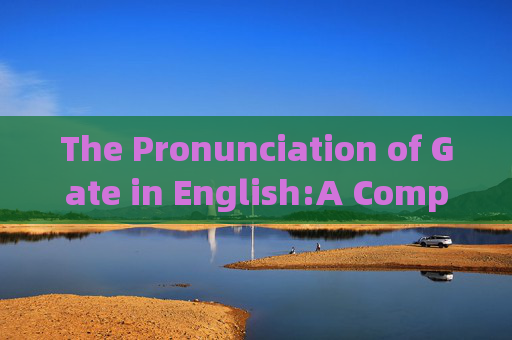本文目录导读:
- Introduction
- ">Phonetic Breakdown of "Gate"
- Common Mispronunciations
- Regional Variations in Pronunciation
- Homophones and Rhyming Words
- Etymology and Related Words
- Practical Tips for Perfect Pronunciation
- Conclusion
Introduction
The English language is filled with words that may seem simple at first glance but can sometimes pose pronunciation challenges for non-native speakers. One such word is "gate." While it appears straightforward, understanding its pronunciation, variations, and related linguistic aspects can enhance one's grasp of English phonetics. This article explores the pronunciation of "gate," its phonetic breakdown, common mispronunciations, regional variations, and related words.
Phonetic Breakdown of "Gate"
The word "gate" is pronounced as /ɡeɪt/ in the International Phonetic Alphabet (IPA). Breaking it down:
- : This is the voiced velar plosive sound, similar to the "g" in "go" or "good."
- /eɪ/: This is a diphthong, a combination of two vowel sounds (/e/ and /ɪ/), producing the long "a" sound heard in words like "say" or "day."
- /t/: This is the voiceless alveolar plosive, the same "t" sound found in "top" or "cat."
When spoken naturally, "gate" rhymes with words like "late," "mate," and "fate."
Common Mispronunciations
Despite its simplicity, non-native English speakers may mispronounce "gate" in several ways:
- Hard "G" Confusion: Some languages (like Spanish or Italian) may soften the "g" sound, leading to a pronunciation closer to "jate" (/dʒeɪt/). However, in English, "gate" always starts with a hard "g."
- Vowel Mispronunciation: Speakers from languages without the /eɪ/ diphthong might say /ɡat/ (like "got") or /ɡæt/ (like "gat"), which are incorrect.
- Silent "E" Misunderstanding: The final "e" in "gate" is silent but influences the preceding vowel, making it long. Some may mistakenly pronounce it as /ɡeɪti/, adding an extra syllable.
Regional Variations in Pronunciation
English dialects can influence how "gate" is pronounced:
- General American English: Pronounced clearly as /ɡeɪt/.
- British Received Pronunciation (RP): Also /ɡeɪt/, though some British accents may slightly elongate the /eɪ/ sound.
- Scottish English: The /eɪ/ may sound closer to /ɛɪ/ or even /eː/, making it slightly different from standard RP.
- Australian English: The diphthong may sound more like /æɪ/, giving it a distinct "Aussie" twang.
- Southern American English: Some speakers might pronounce it closer to /ɡɛɪt/, with a more open vowel sound.
Despite these variations, the core pronunciation remains recognizable across dialects.
Homophones and Rhyming Words
"Gate" has several homophones (words that sound the same but have different meanings) and rhyming words:
- Homophones:
"Gait" (meaning a person's manner of walking) is pronounced identically (/ɡeɪt/).
- Rhyming Words:
Late, fate, mate, rate, plate, state, etc.
This makes "gate" a useful word for understanding English phonetic patterns.
Etymology and Related Words
The word "gate" originates from Old English "geat," meaning an opening or entrance. Related terms include:
- Gateway: (/ˈɡeɪtweɪ/) – An entrance or passage.
- Gated: (/ˈɡeɪtɪd/) – Enclosed by a gate (e.g., "a gated community").
- Gatekeeper: (/ˈɡeɪtkiːpər/) – Someone who controls access.
These derivatives maintain the same /ɡeɪt/ pronunciation in their root.
Practical Tips for Perfect Pronunciation
To master the pronunciation of "gate," consider the following exercises:
- Minimal Pairs Practice: Compare words like "gate" vs. "get" (/ɡɛt/) or "gate" vs. "goat" (/ɡoʊt/) to distinguish vowel sounds.
- Slow Articulation: Break the word into sounds (/ɡ/ /eɪ/ /t/) before blending them smoothly.
- Listening & Repetition: Use pronunciation tools like Google Translate or Forvo to hear native speakers say "gate."
- Tongue Placement: Ensure the back of the tongue touches the soft palate for /ɡ/, then transitions smoothly to the diphthong /eɪ/.
Conclusion
The word "gate" may seem simple, but its pronunciation involves precise articulation of consonants and diphthongs. By understanding its phonetic structure, common errors, and regional variations, learners can improve their spoken English. Whether you're a language student or a curious linguist, mastering words like "gate" is a small but essential step toward fluency.
So next time you say "gate," remember: it's /ɡeɪt/, not "gat," "jate," or "gah-teh." Happy pronouncing!

(Word count: ~1,050)





